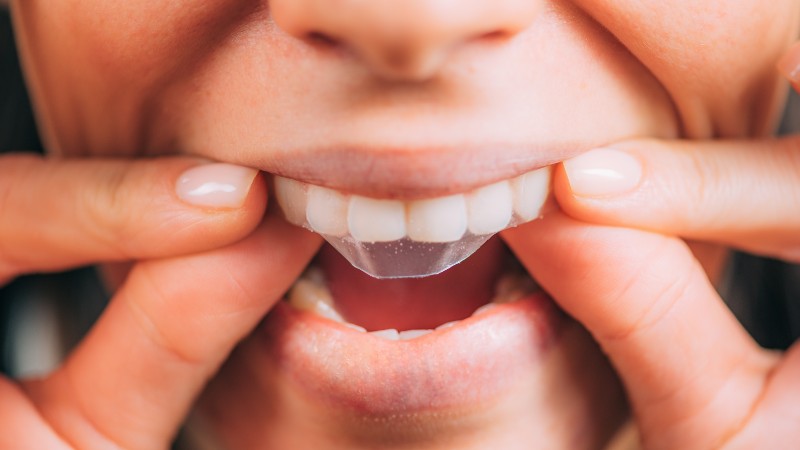
Post-Whitening Dental Care: Practical Tips

Dental whitening is an increasingly popular cosmetic procedure that allows you to have a whiter and brighter smile. However, the effects of the treatment are not permanent and require specific care to maintain the results over the long term.
After undergoing dental whitening, it is essential to follow a series of recommendations and adopt certain habits that help prolong the whiteness and protect the health of your teeth.
In this article, we offer a comprehensive guide with practical tips for caring for your teeth after dental whitening, ensuring that your smile remains as dazzling as the first day.
Why is post-whitening care important?
Dental whitening can provide a whiter and brighter smile, but the effects of this treatment are not permanent and require proper maintenance to prolong their benefits.
Taking proper care of your teeth after whitening is crucial for several reasons that affect both aesthetics and overall oral health.
Prolonging the results of the treatment
One of the main reasons to follow a post-whitening care regimen is to maintain the results of the procedure. After dental whitening, teeth can be more susceptible to staining.
This is because the treatment opens the pores of the dental enamel, making it easier to absorb pigments from foods and beverages. By avoiding certain staining products, such as coffee, red wine, and dark sauces, you can significantly prolong the duration of the whitening.
Reducing dental sensitivity
Dental sensitivity is a common side effect after whitening. During the treatment, the bleaching agents penetrate the dental enamel, which can cause irritation to the dental nerves.
This sensitivity can manifest as discomfort when consuming cold, hot, sweet, or acidic foods or drinks. Implementing measures such as using toothpaste for sensitive teeth and avoiding extreme temperatures in foods and drinks can help manage and reduce this discomfort.
Protecting oral health
Dental whitening, although aesthetic, also has implications for oral health. After the treatment, it is essential to maintain a rigorous oral hygiene routine to prevent plaque buildup and cavities.
Regular brushing, the use of dental floss, and antibacterial mouth rinses help keep the mouth free of bacteria and residues that could compromise both the health and appearance of whitened teeth.
Preventing stains
Freshly whitened teeth are more prone to staining due to the temporarily more porous nature of the enamel. This means that, in addition to avoiding certain foods and beverages, it is essential to follow a diet that does not contribute to new stains.
Opting for white or light-colored foods and staying well-hydrated with water can help prevent the reappearance of stains and keep teeth white for longer.
Foods and beverages to avoid
One of the most important aspects of post-whitening care is avoiding certain foods and beverages that can stain teeth. For at least 48 hours after the treatment, it is advisable to avoid:
- Coffee and tea: These beverages are known for their staining properties.
- Red wine and other dark alcoholic beverages: They can also contribute to staining.
- Dark sauces: Sauces like soy sauce and tomato sauce can stain teeth.
- Dark fruits and juices: Berries, grapes, and their juices can affect tooth whiteness.
- Acidic foods: Citrus fruits and other acidic foods can increase dental sensitivity.
It is essential to maintain a diet free of these foods and beverages during the first 48 hours and, if possible, limit their consumption in the long term to maintain whitening results.
How to manage dental sensitivity
Dental sensitivity is a common side effect after whitening. Here are some tips to manage this discomfort:
- Use toothpaste for sensitive teeth: These toothpastes contain ingredients that help reduce sensitivity.
- Avoid very cold or very hot foods and drinks: Extreme temperatures can increase sensitivity.
- Brush carefully: Use a soft-bristled toothbrush and brush gently to avoid irritating teeth and gums.
- Rinse with warm water and salt: A gentle rinse can help relieve discomfort.
These care measures can help reduce dental sensitivity and make the post-whitening period more comfortable.
Benefits of maintaining good oral hygiene
Maintaining good oral hygiene after dental whitening is crucial to preserving the results. The benefits include:
- Prevention of stains: Brushing teeth at least twice a day and using dental floss helps remove particles that can cause stains.
- Overall mouth health: Good oral hygiene prevents problems such as cavities and gum disease.
- Fresh breath: Keeping teeth clean also helps avoid bad breath.
To maximize these benefits, it is advisable to follow an oral hygiene routine that includes mouthwash and regular dental visits.
What to do if the results are not lasting?
Sometimes, the results of dental whitening can fade faster than expected. If you notice your teeth losing their whiteness, consider the following steps:
- Consult your dentist: A professional can recommend additional treatments or products to maintain whiteness.
- Use maintenance products: There are toothpastes and mouthwashes specifically formulated to maintain whitening results.
- Avoid staining habits: Smoking and consuming foods and drinks that stain should be avoided to prolong the results.
Regular dental visits
Regular dental visits are an essential part of post-whitening care. During these visits, the dentist can:
- Monitor the health of your teeth and gums: Ensuring there are no underlying problems that could affect whitening results.
- Perform professional cleanings: These cleanings remove plaque and tartar that can cause stains.
- Offer maintenance treatments: Such as additional whitening or fluoride applications to strengthen teeth.
These visits not only help maintain the whiteness of your teeth but also ensure that your overall oral health is in optimal condition.
Dental whitening can transform your smile, but to maintain those results, it is essential to follow a series of post-whitening care steps.
Avoiding certain foods and drinks, managing dental sensitivity, maintaining good oral hygiene, and regularly visiting the dentist are key steps to prolonging the whiteness of your teeth.
By following these practical tips, you will not only preserve the effects of whitening but also contribute to your overall oral health
Share



